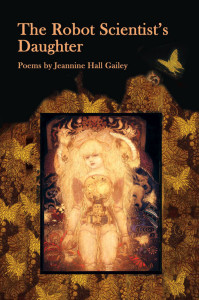Book Review: The Robot Scientist’s Daughter
 The Robot Scientist’s Daughter
The Robot Scientist’s Daughter
by Jeannine Hall Gailey
Mayapple Press
Paperback, 9781936419425, 82pp.
Publication Date: March 1, 2015
It’s hard to resist a book with the title The Robot Scientist’s Daughter. Those four words send the mind in a myriad of directions. Is this science fiction? A child’s tale? A woman’s story? A cousin of Frankenstein? And the answer would be, ‘yes, it is, and more. Genre be damned.’
The story unfolds via poetry—little glimpses of life pressed to each page like butterflies pinned to a board. And, like life, it can’t all be told at once, nor in order, and not always in the same mood. The days of the life of the Robot Scientist’s Daughter can be peaceful and beautiful, yet burdened by the price that must be paid. Other times, the nightmares are close to the surface and not always hidden behind sleeping eyes. It’s complicated to be the Robot Scientist’s Daughter.
She lives amongst the clutter and ruins of a Project called Manhattan, quite literally within a notable hot spot. Atomic bombs, nuclear reactors, softly dying plants and animals (and people), weapons grade uranium, idyllic meadows, these are the puzzle pieces that make up the landscape of her childhood. It’s where she grew up, learning, as children do, about their surroundings. She knows the birds and the strawberries and is a true child of nature, such as it is. Her realities are our nightmares, and her dreams are our history.
I wavered as she charmed, terrified, soothed and disturbed me. I often stopped to stare at the palm of my right hand—the same hand that, as a child, I would cup to hold a large blob of mercury and roll it around, watching how pretty it was as it sparkled and undulated, before easing it back into the little tube I would carry around in my pocket.
My hand looks smooth and healthy, after all these years. I can’t help but feel a kinship with the Robot Scientist’s Daughter. We are survivors, we are the products of our time, and we are strong and clever, knowledgeable in the ways of unnatural nature. We survived in the worst of times, how can we help but thrive in the best of times?
Visit Jeannine Hall Gailey’s website to learn more about her.